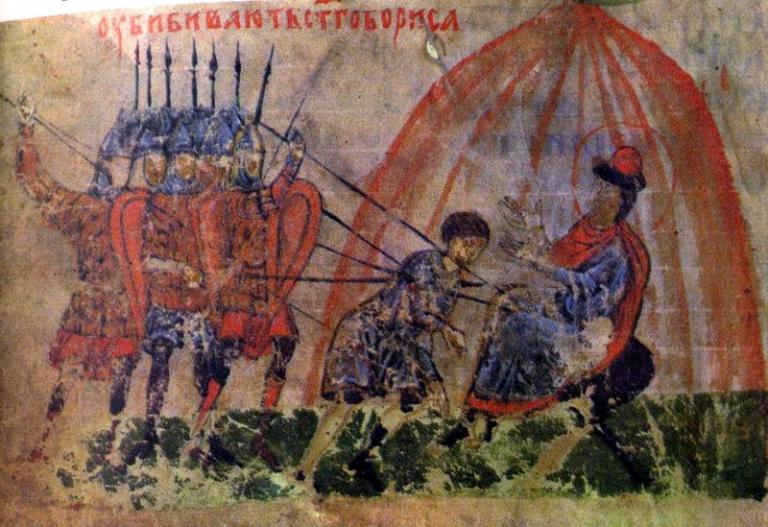
One of the differences in Western Christianity, in both its Catholic and Protestant versions, and Eastern Christianity, the Orthodox tradition, is their positions on the relationship between the church and the state. Specifically, Orthodoxy emphasizes a radical submission to the earthly rulers. Whereas in Western Christianity, Christians often defy the state.
So says Mark Tooley in an interesting article in an interesting journal, Providence: A Journal of Christianity & American Foreign Policy. From Tyranny and Russian Orthodoxy:
In the West, the church has often defined itself by defying the state. In the East, particularly Russia, the church traditionally understands itself as more submissive consort to the regime. . . .
Arguably the Russian church’s submissive stance towards rulers dates to the very beginning. Russia’s earliest saints are the eleventh century Princes Boris and Gleb, sons of Prince Vladimir of Kiev, considered the baptizer of Russia and a rough equivalent of Constantine. An older son gained the throne and dispatched assassins to kill his potential brotherly rivals. Rather than fleeing or resisting, Boris awaited his execution by singing psalms and praying for his murderous older brother who was now his ruler. Gleb likewise awaited his own murder with prayerful resignation. The slain brothers were canonized as “passion-bearers” who submitted to authority rather than resist with violence.
Submission to authority as spiritually exemplary has been a constant theme in Russian history thanks partly to this venerated example. . . .
The Western Christian political tradition is less submissive, perhaps dating to when Bishop Ambrose of Milan compelled Emperor Theodosius publicly to repent of his punitive slaughter of a coliseum audience in Thessalonica. Western saints like Thomas Becket and Thomas More defied their monarchs in fidelity to the church. Protestants like John Knox confronting Mary Queen of Scots and Oliver Cromwell against Charles I raised Christian resistance of unjust earthly authority to a new level.
[Read the whole article. . .]
Luther sometimes counseled radical submission, even as he defied the Emperor and castigated tyrants like Henry VIII (despite his Protestantism).
Certainly much of the Eastern church had to labor under the domination of Islam, which allowed Christians no say whatsoever in their government. The Russian church existed under the absolutism of the Czars, who, however, were strong patrons of the church. Another factor would be the influence of monasticism, which encouraged separation from the world and a relatively other-worldly spiritual emphasis.
I’d like to hear from our Orthodox readers. Do you feel this way, that you should always be submissive to the state? Lots of Orthodox people in America were converts from evangelicalism or Catholicism. If that applies to you, has your new church changed your stance towards your ability to accept the earthly government?
Are there cultural–perhaps more than theological–dynamics at work? I suspect that an Orthodox Christian who is an American may be more willing to criticize the government than an Orthodox Christian who is a Russian. Is this true? Or not?
Should Americans and Western Christians in general be more deferential to our earthly rulers, in light of Romans 13, despite the reflex–which characterizes both the Left and the Right–to criticize our government? Or does the fact that our government is a democratic republic, with ultimate authority vested in “the people,” in which we rule our “rulers,” mean that all citizens–including Christians–are obliged to make critical judgments about our government?
Illustration: The Tale of the Holy Martyrs Boris and Gleb. The murder of Boris. Illumination from the Sylvester Miscellany. 14th century. Central State Archive of Ancient Documents, Moscow. [Public Domain]














